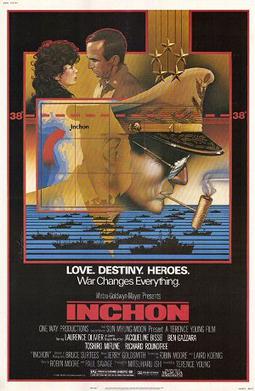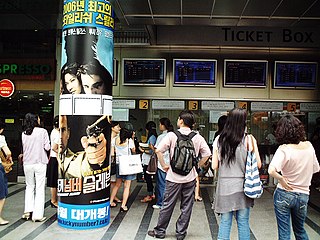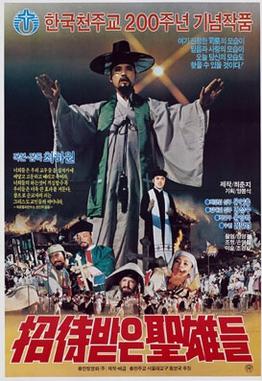| Lists of South Korean films by year |
|---|
 |
| Korean Animation |
A list of films produced in South Korea in 1981:
| Lists of South Korean films by year |
|---|
 |
| Korean Animation |
A list of films produced in South Korea in 1981:

The action film is a film genre which predominantly features chase sequences, fights, shootouts, explosions, and stunt work. The specifics of what constitutes an action film has been in scholarly debate since the 1980s. While some scholars such as David Bordwell suggested they were films that favor spectacle to storytelling, others such as Goeff King stated they allow the scenes of spectacle to be attuned to story telling. Action films are often hybrid with other genres, mixing into various forms ranging to comedies, science fiction films, and horror films.
The following is an overview of events in 1981 in film, including the highest-grossing films, award ceremonies and festivals, a list of films released and notable deaths.
The following is an overview of events in 2007 in film, including the highest-grossing films, award ceremonies and festivals, a list of films released and notable deaths. The highest-grossing film of the year was Pirates of the Caribbean: At World's End, which was just marginally ahead of Harry Potter and the Order of the Phoenix. 2007 is often considered one of the greatest years for film in the 21st century.

Naju is a city in South Jeolla Province, South Korea.

Inchon is a 1981 war film about the Battle of Inchon, considered to be the turning point of the Korean War. Directed by Terence Young and financed by Unification movement founder Sun Myung Moon, the film stars Laurence Olivier as General Douglas MacArthur, who led the United States' surprise amphibious landing at Incheon, South Korea in 1950, with Jacqueline Bisset, Ben Gazzara, Toshiro Mifune and Richard Roundtree.

Choi is a Korean family surname. As of the South Korean census of 2015, there were around 2.3 million people by this name in South Korea or roughly 4.7% of the population. In English-speaking countries, it is most often anglicized Choi, and sometimes also Chey, Choe or Chwe. Ethnic Koreans in the former USSR prefer the form Tsoi (Tsoy) especially as a transcription of the Cyrillic Цой.
Endless Love may refer to:

South Korean films have been heavily influenced by such events and forces as the Korea under Japanese rule, the Korean War, government censorship, the business sector, globalization, and the democratization of South Korea.

The crested ibis, also known as the Japanese crested ibis, Asian crested ibis or toki, is a large, white-plumaged ibis of pine forests, native to eastern Asia. Its head is partially bare, showing red skin, and it has a dense crest of white plumes on the nape. It is the only member of the genus Nipponia.
Dragon Lee is an actor and practitioner of Taekwondo and Hapkido. He made a name for himself as a martial arts film star in the 1970s and 80s. His birth name is Moon Kyung-seok, but he has also been called Keo Ryong in South Korea.

Jung is a Latin alphabet rendition of the Korean family name "정", also often spelled Jeong, Chung, Joung or Jong. As of the South Korean census of 2015, there were 2,407,601 people by this name in South Korea or 4.84% of the population. The Korean family name "정" is mainly derived from three homophonous hanja. 鄭 (2,151,879), 丁 (243,803) and 程 (11,683). The rest of the homophonous hanjas include: 政 (139), 桯 (41), 定 (29), 正 (22) and 情 (5).
This is a list of films by year produced in the country of South Korea which came into existence officially in September 1948. The lists of Korean films are divided by period for political reasons. For earlier films of united Korea see List of Korean films of 1919–1948. For the films of North Korea see List of North Korean films. For an A-Z list of films see Category:Korean films.
Running Man may refer to:

Invited People is a 1981 South Korean film directed by Choi Ha-won. It was chosen as Best Film at the Grand Bell Awards.

Namkoong Won was a South Korean actor. Namkoong was born Hong Gyeong-il in 1934. He was a popular actor of the 1960s along with Shin Seong-il, Shin Young-kyun and Choi Moo-ryong. His son was South Korean politician, Hong Jung-wook. Namkoong died from cancer at the Asan Medical Center in Seoul, on 5 February 2024, at the age of 89.
Lee Hye-young is a South Korean actress. She is the daughter of celebrated film director Lee Man-hee, who died in 1975 when she was in middle school. Lee began her acting career in 1981 at the age of 18 through a local musical theatre production of The Sound of Music. Since then she has performed in theater, feature and short films, and television. She was one of the most prominent South Korean actresses in the 1980s, starring in films such as The Blazing Sun (1985), Winter Wanderer (1986), Ticket (1986), The Age of Success (1988), North Korean Partisan in South Korea (1990), Fly High Run Far (1991), Passage to Buddha (1993), and No Blood No Tears (2002). Lee also played supporting roles in the Korean dramas I'm Sorry, I Love You (2004), Fashion 70's (2005) and Boys Over Flowers (2009).

The Attorney is a 2013 South Korean courtroom drama film co-written and directed by Yang Woo-suk.

Chun Doo-hwan was a South Korean army general and military dictator who ruled as an unelected strongman from 1979 to 1980 before replacing Choi Kyu-hah as president of South Korea from 1980 to 1988.
Freezing Point is the debut novel of Japanese novelist Ayako Miura, first serialized on Asahi Shimbun between 1964 and 1965. The novel won Asahi Shimbun's Ten Million Yen Award.